Meet Our First Cohort of 2023 Indigenous Youth Fellows
16 Agustus 2023agnes
Sat, 08/12/2023 – 12:25
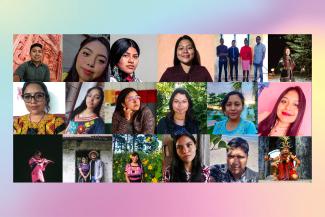
On International Youth Day, Cultural Survival is pleased to announce our first cohort of 2023 Indigenous Youth Fellows as part of our Capacity Building Program. Our Indigenous Youth Fellowship supports young Indigenous leaders between the ages of 18-28 who are working to transform their communities and create opportunities for the elevation, defense, and strengthening of their cultures and traditions, while developing their leadership, organizational, and project management skills. Since 2018, we have awarded 110 fellowships supporting 204 fellows.
The fellowship projects focus on language revitalization, land protection, media and art, and reclaiming of traditions, among other themes. The involvement and participation of Indigenous youth are fundamental for intergenerational knowledge transfer and cultural continuity– as today’s youth are the future leaders of their communities.
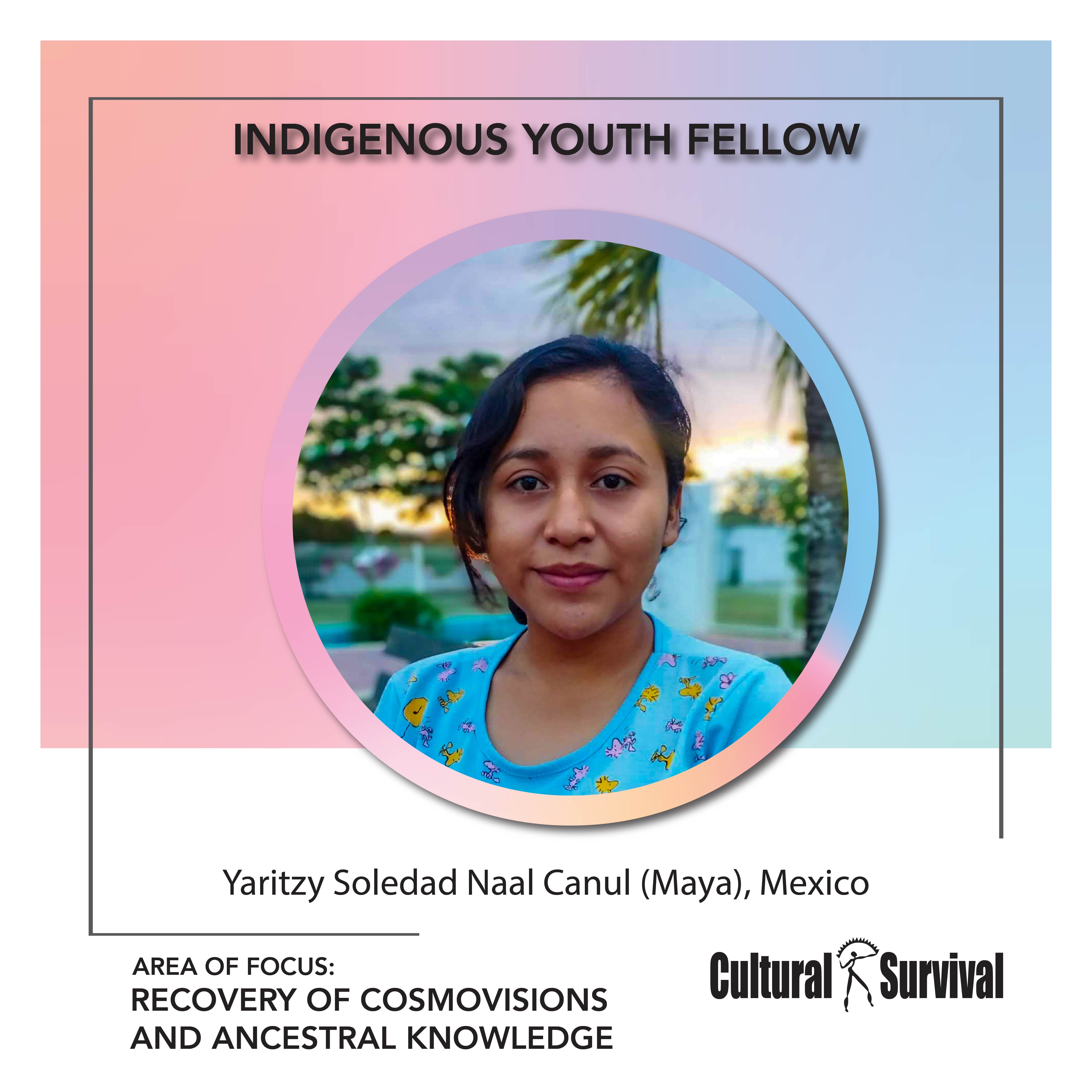
Yaritzy Soledad Naal Canul (Maya) from Mexico
Area of focus: Recovery of Traditional Agriculture
Yaritzy Soledad Naal Canul (Maya) was born and raised in José María Morelos, Quintana Roo, Mexico. She is currently studying agroecological production systems engineering at the Intercultural Mayan University of Quintana Roo. In addition to being a student, she is a young farmer. “My family are farmers and are my motivation in my journey,” Yaritzy says. “I am inspired by them and the group of farmer members of the Milpa Colectiva KM50, who have inspired and accompanied me in the organization Ka’ Kuxtal Much Meyaj A.C. in Hopelchén, Campeche.”
Yaritzy’s fellowship project is “The Intergenerational Collective Milpa,” an initiative that aims to expand the diversity of seed cultivation in the region, as well as to encourage more young people to become interested in traditional agriculture as a source of cultural responsibility and professional training.
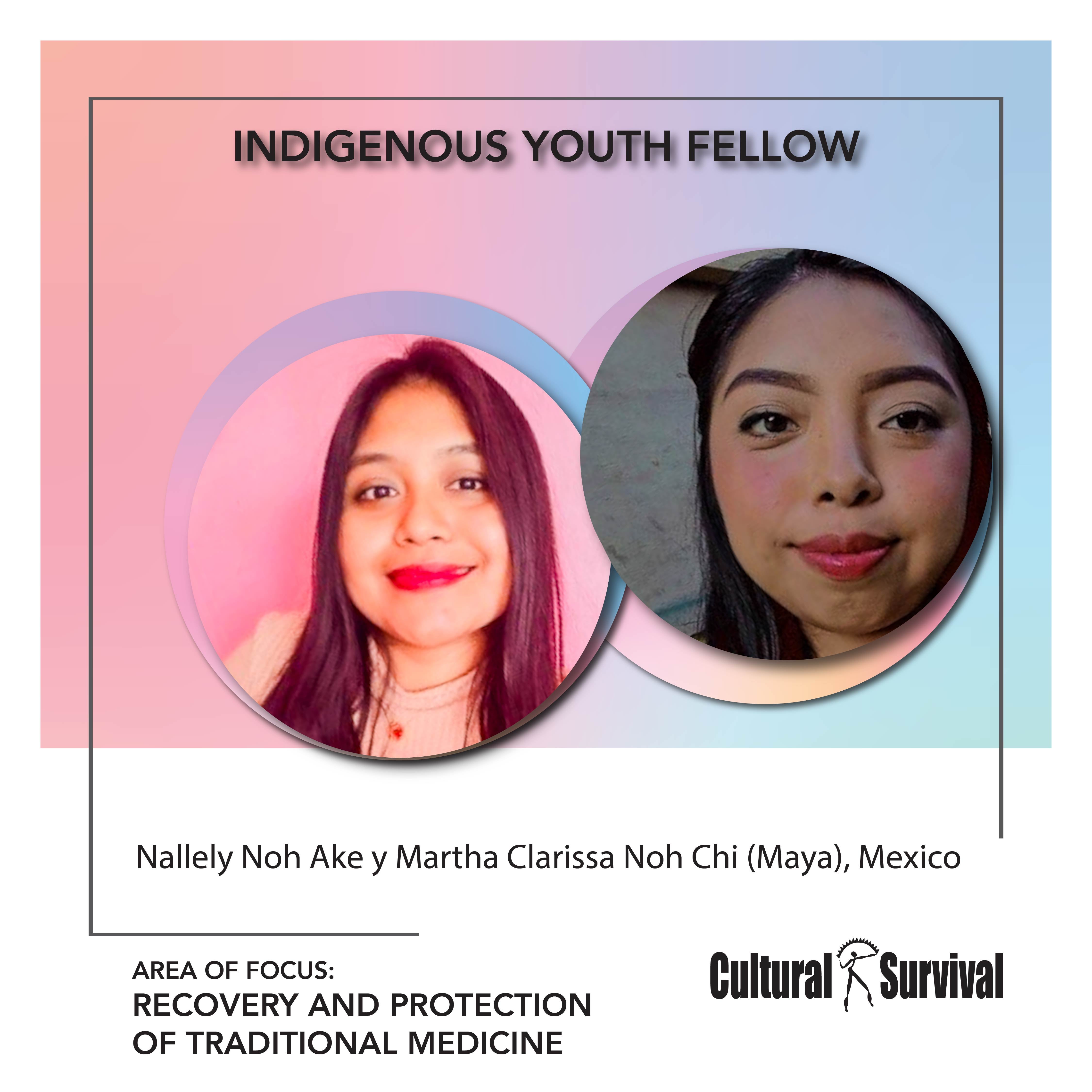
Nallely Noh Ake and Martha Clarissa Noh Chi (Maya) from Mexico
Area of Focus: Recovery and Protection of Traditional Medicine
Nallely Noh Ake (Maya) recently graduated from the Mayan Intercultural University of Quintana Roo with a degree in agroecological production systems engineering. She enjoys nature and practicing sustainability, and likes to share her knowledge with the people in her community.
Martha Clarissa Noh Chi (Maya) is from El Naranjal, José María Morelos, Quintana Roo, and a student in municipal management at the Mayan Intercultural University of Quintana Roo. She is married and mother to a four-year-old daughter. She loves plants and everything related to nature, learning new things and putting them into practice, as well as sharing her knowledge with other people.
Their project, “Medicinal Plants of El Naranjal,” seeks to recover the knowledge of traditional medicine in their community and share it for the health and well being of the local people. The project seeks to reduce people’s health care expenses outside the community and motivate them to return to traditional medicine for their primary care.
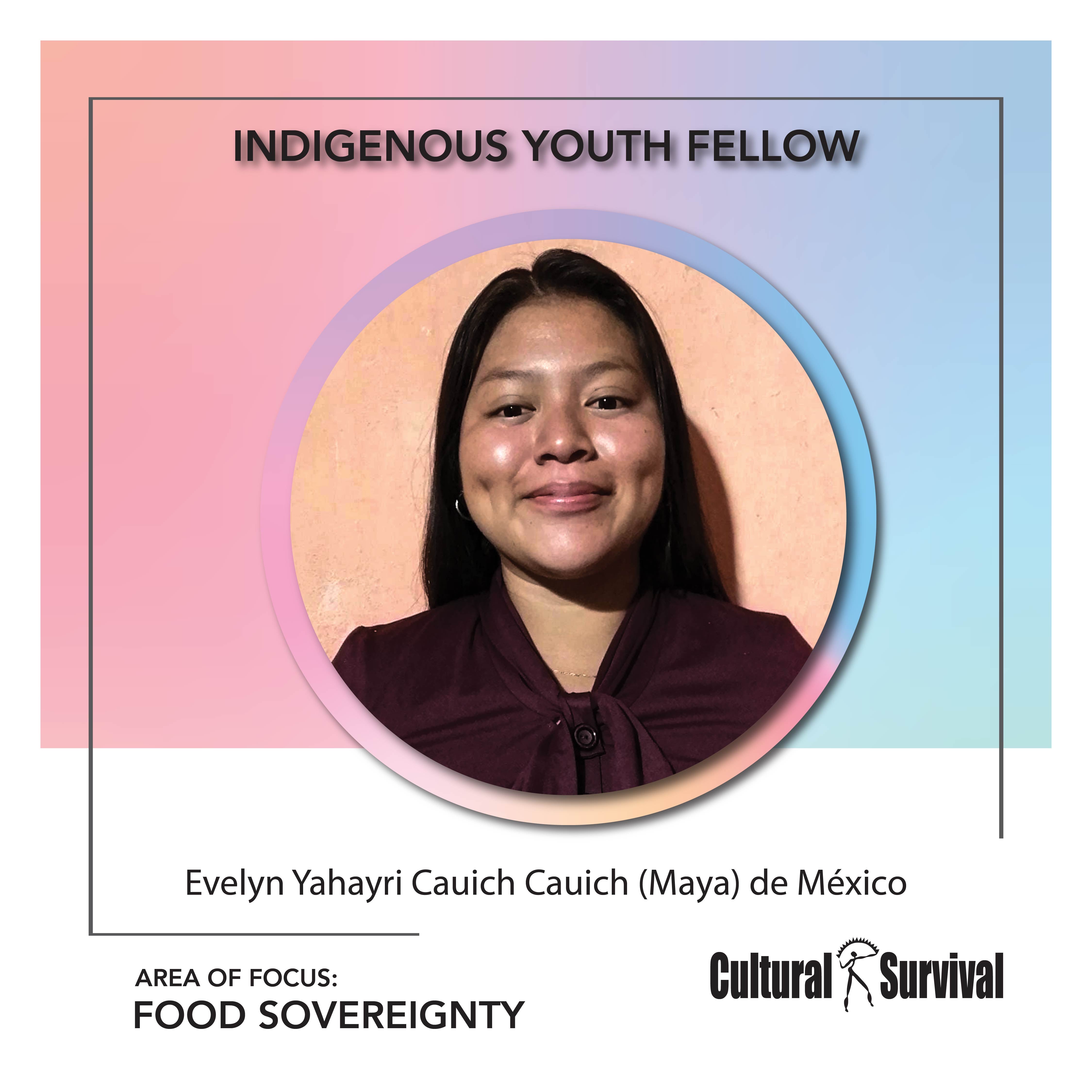
Evelyn Yahayri Cauich Cauich (Maya) from Mexico
Area of Focus: Food Sovereignty
Evelyn Yahayri Cauich Cauich (Maya) was born in Cancun, Quintana Roo, Mexico. She lives with her family in the community of Xcalot-Aktal, Hopelchén, where they cultivate corn without the use of agrochemicals for the care of the health of their land and community.
Evelyn developed the project “Celebration of Xcalot – Akal Native Seeds,” through which she seeks to strengthen the knowledge about local seeds and farmers in her community. In addition, this project seeks to bring together exhibitors and farmers in a capstone event to explore and share their experiences.
.jpg)
The Mother Earth Project (Kamba/Gikuyu) from Kenya
Area of Focus: Climate Change Solutions
The Mother Earth Project, is led by nine Kamba and Gikuyu youth, Joshua Mbindyo Mutunga, Chemitei. J. Janet, Robert Mutua Mila, Thereza Mercy, Peter Kinyanjui, Elijah Muli, Ambrose Mugume, Kenneth Gitunda, and Alex Kamau. The group, is dedicated to advocating for the empowerment and betterment of Indigenous youth. With a deep passion for social change and extensive experience in community development, they create meaningful opportunities for young artists and entrepreneurs to thrive. Through co-creation, they have successfully implemented various initiatives that promote storytelling for community empowerment, educational gatherings, cultural preservation, and self-expression within Indigenous communities. The youth group strongly believe in the power of collaboration and are committed to building strong relationships to drive positive change through their fellowship project.
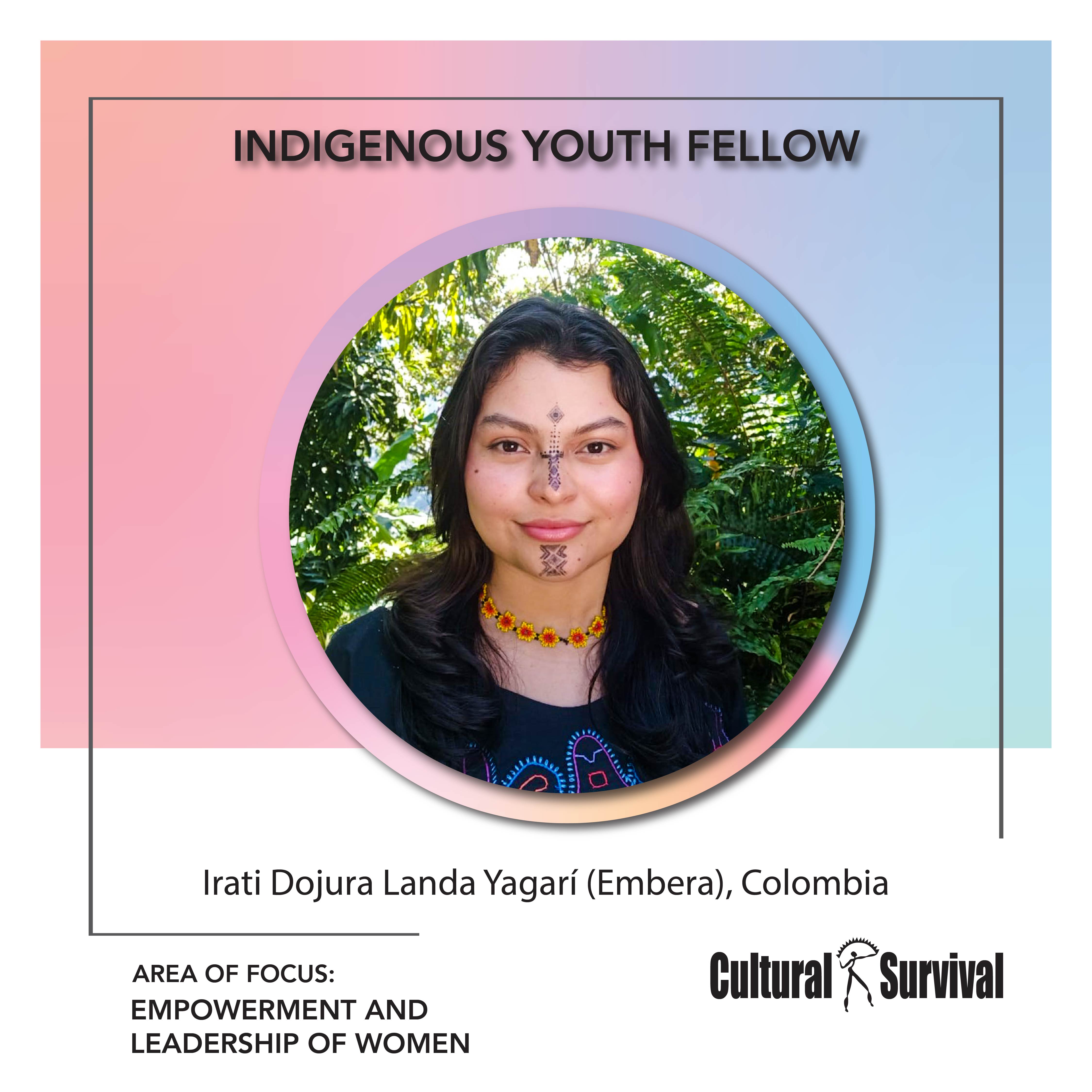
Irati Dojura Landa Yagarí (Embera) from Colombia
Area of focus: Empowerment and Leadership of Women
Irati Dojura Landa Yagarí (Embera) is from the Karmata Rúa reserve in the municipality of Jardín, Antioquia. She studied Audiovisual and Multimedia Communication at the University of Antioquia in Medellin and has experience in directing, production, and photography. Her first narrative short film, “Akababuru: Expresión de Asombro,” was a winner of the FDC Film Development Fund in the category of short films on ethnic populations. She has participated in the Daupará, MUCIWA Wayúu, and Emberá de Caldas Indigenous film and video exhibitions and received numerous awards for her art direction at the Equinoxio and Fulana Fest. She also produced a series of podcasts about the Indigenous population of Medellín called “Ijarabu, en los sueños te recuerdo” (Ijarabu, in my dreams I remember you), a project that received an award from the Medellín mayor’s office in 2021 and 2022. Seven years ago, Irati had to leave her reservation to pursue her university studies. However, she never lost her connection to her territory and has carried the ancestral and cultural legacy of her people in her projects.
Her fellowship project titled,”Kiraparamia,” is an audiovisual project based on stories and legends of the Embera . Through this film, she will tell a story of the Embera Peoples in their native language with a diverse and gendered perspective.
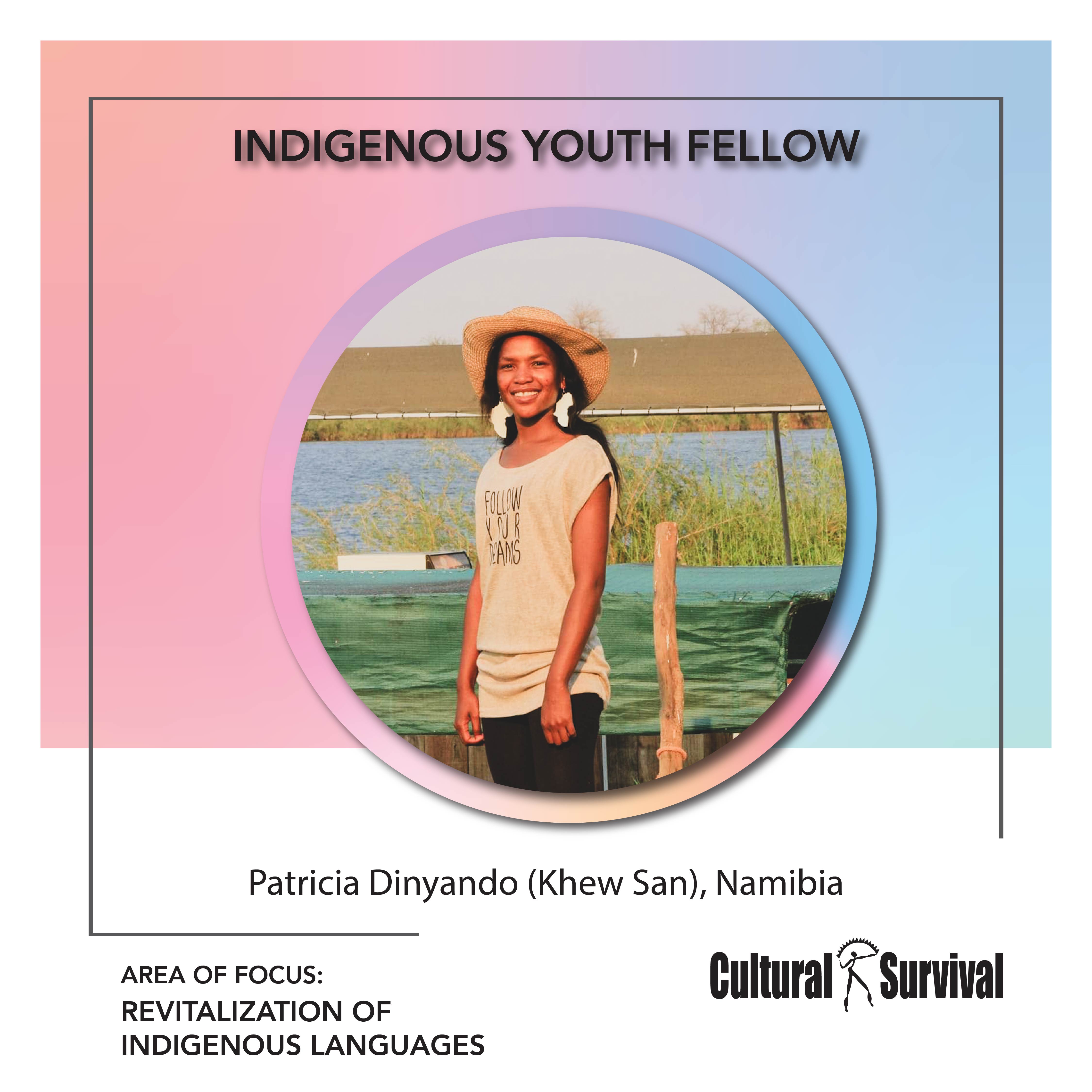
Patricia Dinyando (Khew San) from Namibia
Area of Focus: Revitalization of Indigenous Languages
Patricia Dinyando (Khew San) is a third year student at the University of Namibia pursuing a bachelor’s degree in education. Hailing from a Khwe San community, for the past five years Patricia has volunteered at the Women’s Leadership Center, contributing to its mission of empowering women to actively participate in shaping policy. In addition, she serves as a facilitator for the Young San Women and San Girls Group where she plays a vital role in empowering and supporting these women. Patricia is developing the project “Khwe Folktales,” which aims to collect folktales that have been told for generations in her community into a children’s book, documenting this traditional knowledge so that it can be passed on to many more generations.
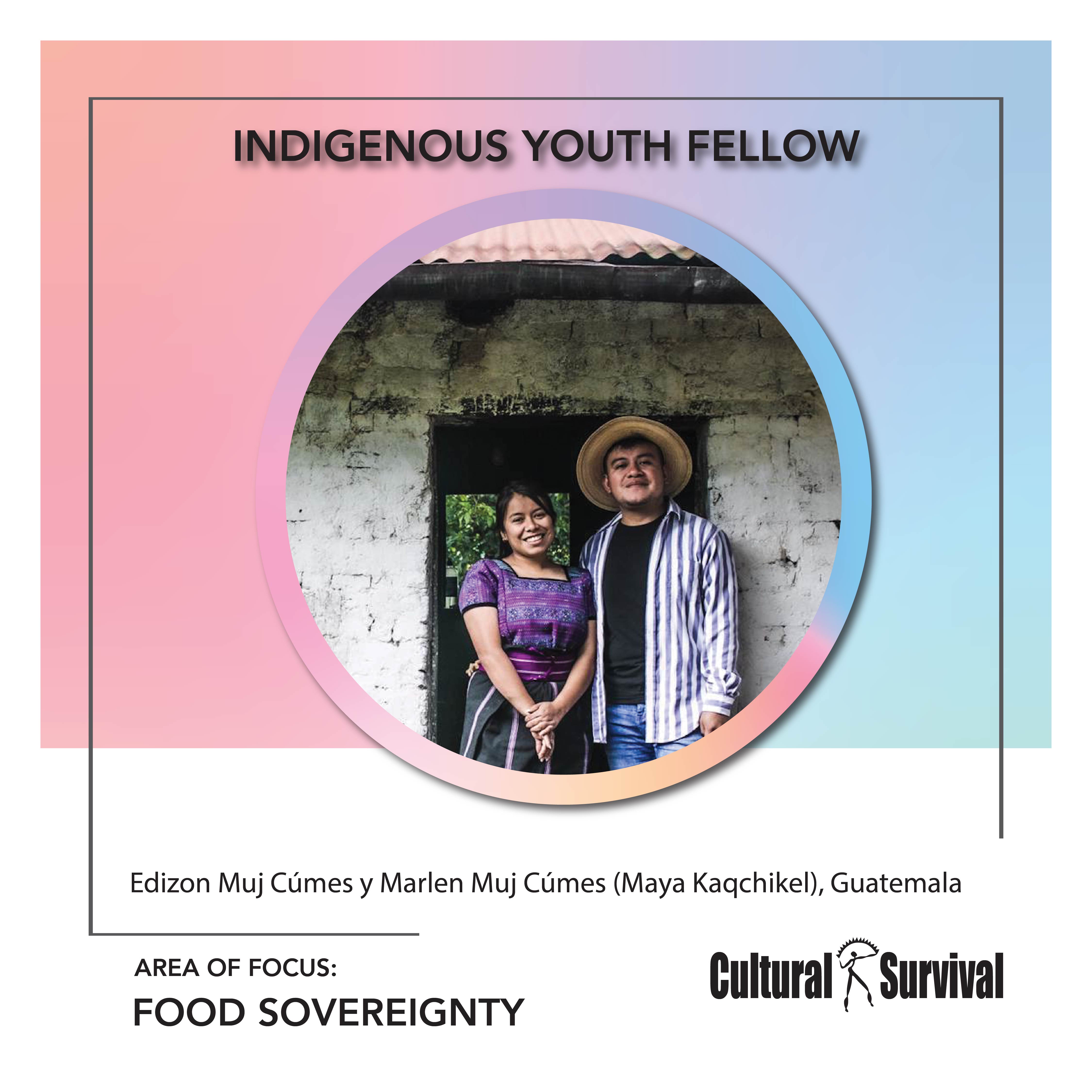
Edizon Muj Cúmes and Marlen Muj Cúmes (Maya Kaqchikel) from Guatemala
Area of Focus: Food Sovereignty
Edizon Muj (Maya Kaqchikel) is from San Andrés Semetabaj. His relationship with nature and the territory to which he belongs, combined with living with his grandparents, led him to study engineering in agroforestry technology. He is currently working on a master’s degree in ecology and the environment at Universidad Autónoma Metropolitana in Mexico. He believes in the milpa, the forests, and the kitchen as political spaces to manage and sustain life for Indigenous Peoples.
Marlen Muj Cúmes (Maya Kaqchikel) is also a student of agroforestry technology engineering and is passionate about nature, natural resources, and the milpa as an agroforestry system of Indigenous Peoples. She is interested in positioning the milpa as a food system that sustains communities and resists dependence on capitalist food systems.
Edizon and Marlen are developing the project, “Fungi after the Milpa,” which seeks to expand knowledge and techniques on the agricultural treatment of mushroom crops in their region.
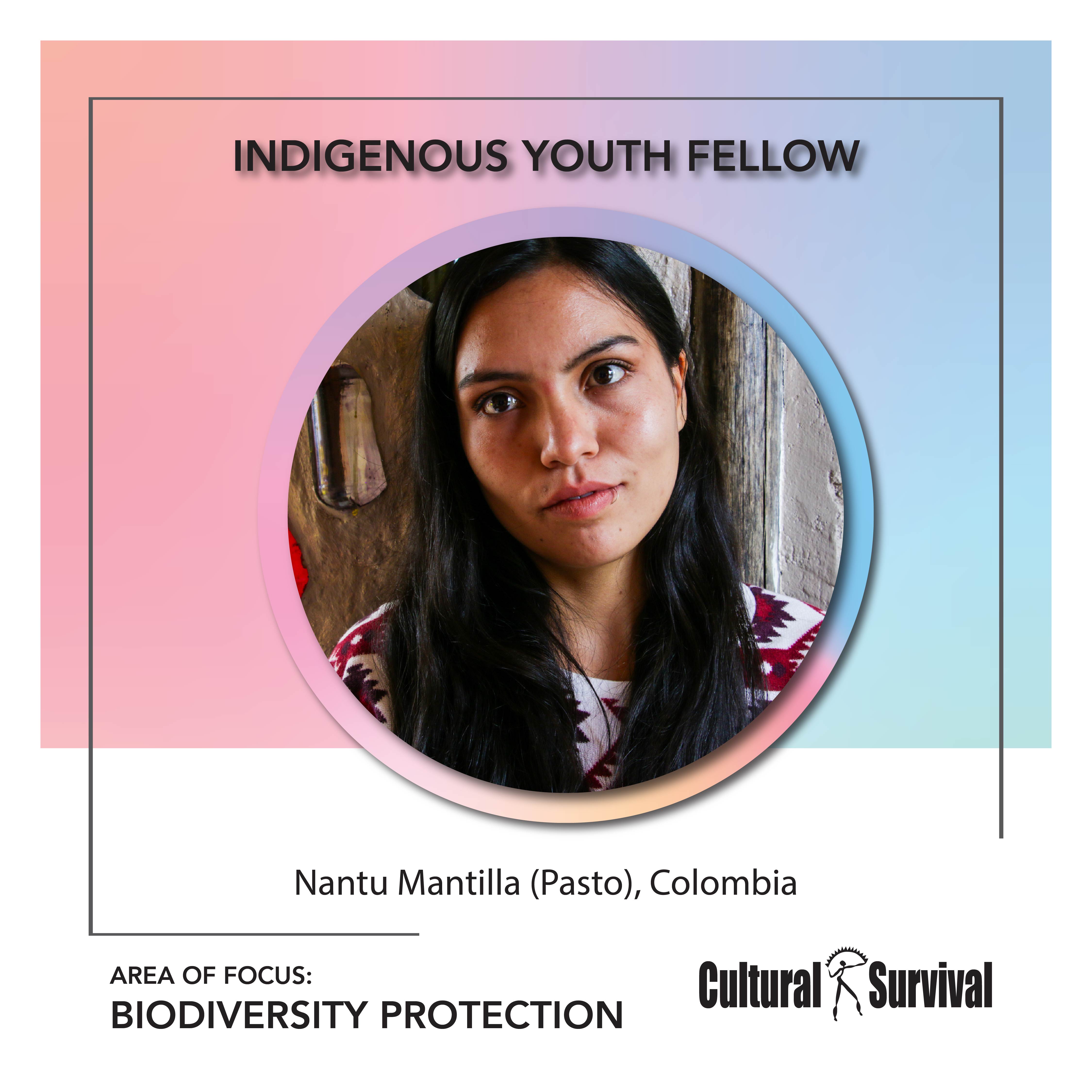
Nantu Mantilla (Pasto) from Colombia
Area of focus: Biodiversity Protection
Nantu Mantilla (Pasto) was born in Tulcán, an Ecuadorian territory bordering Colombia, to an agricultural and artisan family. She studied filmmaking at the Universidad de las Artes de Guayaquil and graduated with a master’s degree in Communications from the Universidad Simón Bolívar, Andean University of Quito. She is the director and producer of several documentaries that have participated in national and international festivals. Seven years ago, she worked as a cultural manager in her community in El Consuelo, where her family has a permaculture community center called Kimbi. For the past three years, she has been part of the Los Frailejones Ecological Club, which she has supported in the areas of communication and environmental education with a focus on the arts.
Nantu’s fellowship project will develop biweekly workshops on botany from her laboratory to foster the connection among culture, ancestral knowledge, and agriculture.
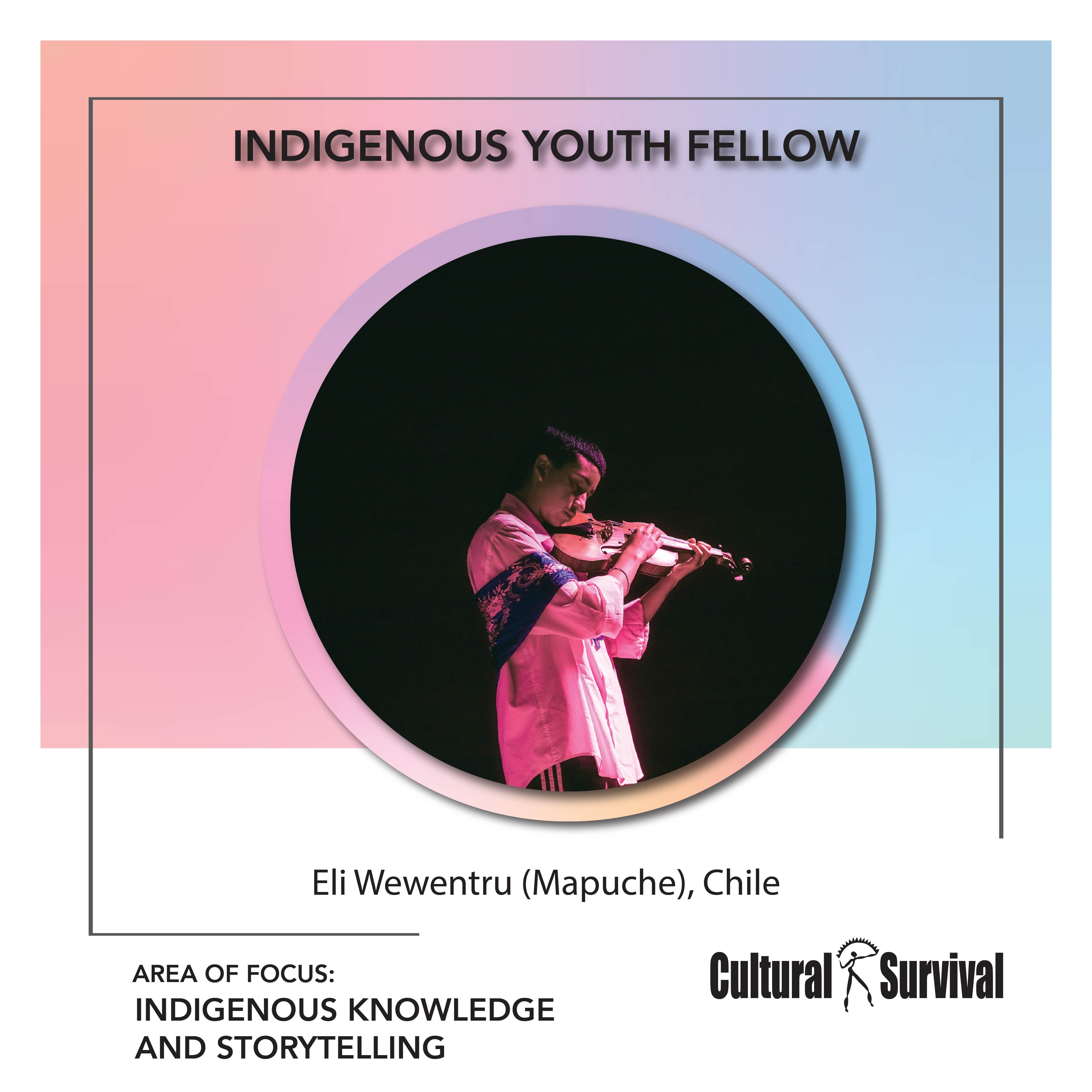
Eli Wewentru (Mapuche) from Chile
Area of focus: Indigenous Knowledge and Storytelling
Eli Wewentru (Mapuche) is an artist originally from PLC – Temuco, Wallmapu, Chile. He began his musical career at age nine in the Padre Las Casas Children’s Orchestra. He later studied musical interpretation and furthered his artistic growth in different countries in Latin America and Europe. From an early age, he shared his musical knowledge and compositions in rural schools within Mapuche communities.
Eli currently lives in Chomio and works with musical composition, sound art, audiovisual media, performance, and as a violin teacher. He also takes care of animals and works the land. His work focuses on decentralizing art from elitist spaces and big cities, as well as new explorations in sound with western instruments, specifically the violin and cello, while making music linked to his cultural heritage.
Eli’s fellowship project proposes a cycle of activities focused on children ages 5 to 13 in rural Mapuche communities to generate interest in the exchange of sound, visual, and performance art.

Santos Melchor Noh Pech (Maya) from Mexico
Area of Focus: Entrepreneurial Skills and Transmission of Traditional Knowledge
Santos Melchor Noh Pech (Maya) was born in the town of XCalakdzonot Chankóm in Yucatan. From the time he was a child, his parents taught him his mother tongue, the Mayan language. At 18 he left for the city of Valladolid to pursue his studies at the Universidad de Oriente. He now holds a degree in Mayan linguistics and culture and has had the opportunity to work with young university students teaching the Mayan language to children and working with artisans in the community.
In his fellowship project, Santos seeks to encourage children to become interested in the creation of handmade ceramics, which is an important cultural and economic activity in the region.
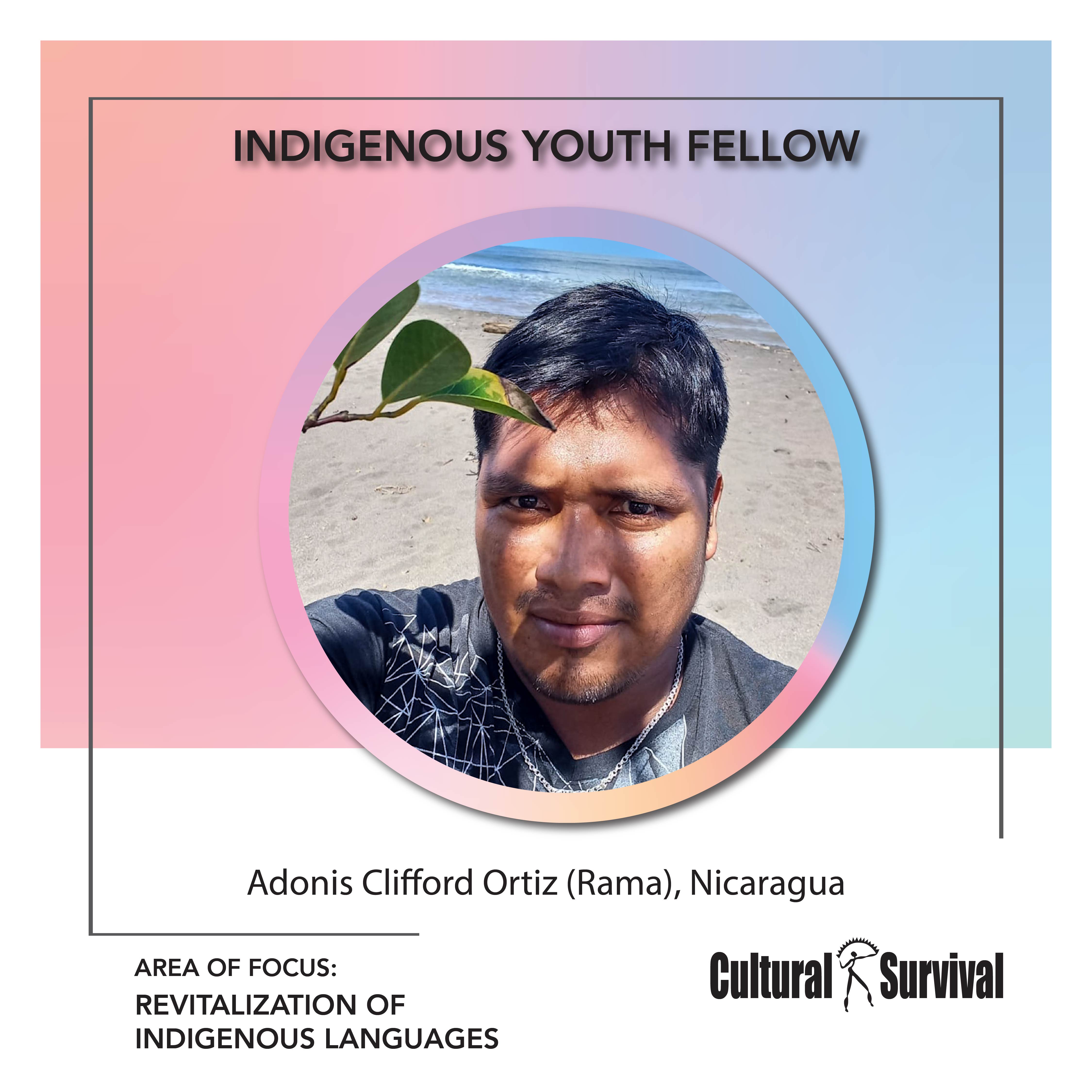
Adonis Clifford Ortiz (Rama) from Nicaragua
Area of Focus: Revitalization of Indigenous Languages
Adonis Clifford Ortiz (Rama) was born and raised in Bluefields county, where he still resides. He completed his university studies at the Bluefields Indian and Caribbean University and graduated with a degree in business administration in 2019.
Adonis’ fellowship project seeks to promote cultural and artistic events with the participation of Rama youth to strengthen cultural pride. In addition, he hopes to develop courses in Rama for young people to strengthen their linguistic skills.
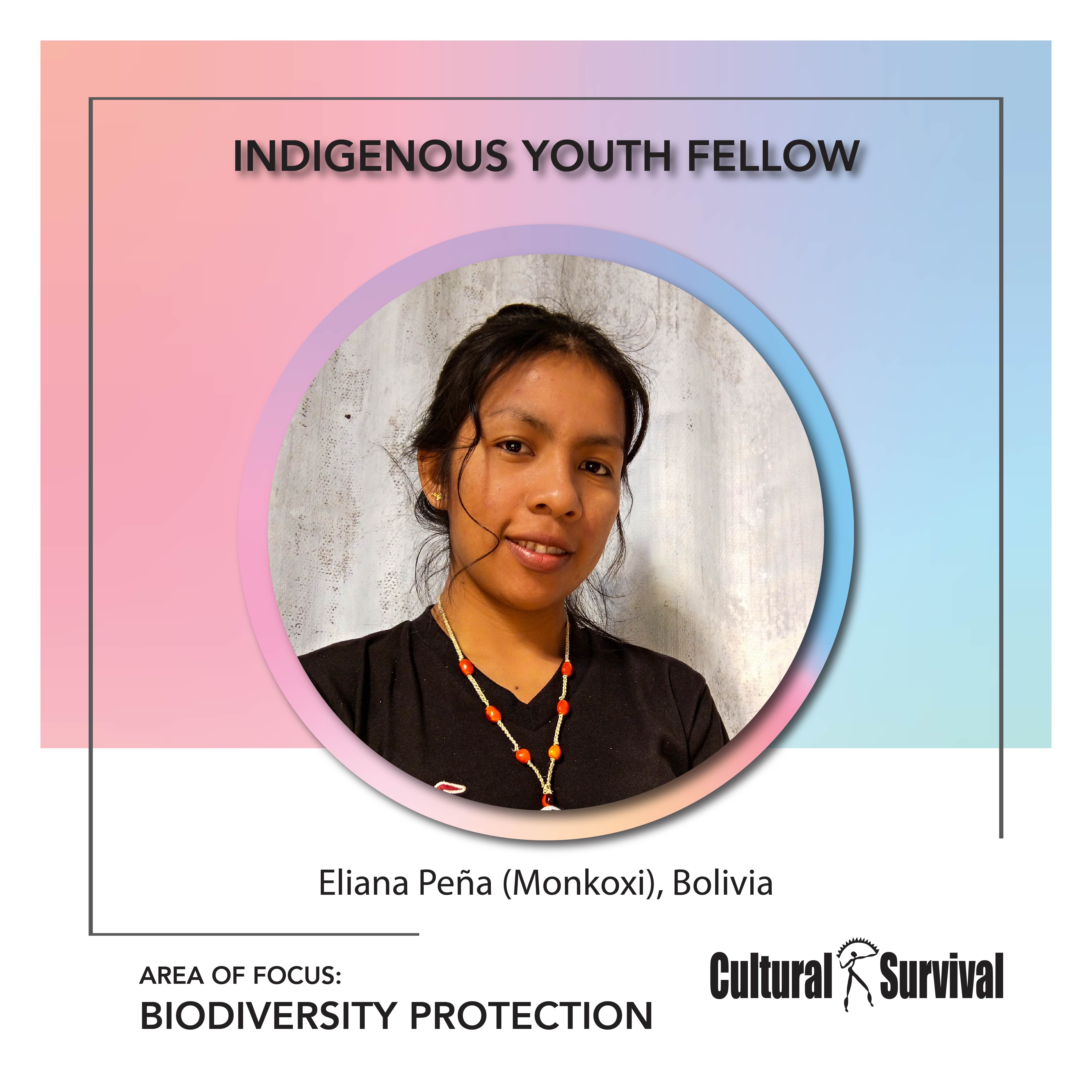
Eliana Peña (Monkoxi) from Bolivia
Area of focus: Biodiversity Protection
Eliana Peña (Monkoxi) was born in the community of Palmira Lomerío in Santa Cruz, Ñuflo de Chávez province, Bolivia. Her parents are Monkoxi and speak the Bésiro language. In January 2020, she entered technical training in gastronomy at the Mana School in the city of Santa Cruz de la Sierra, finishing the program in July 2021. From September to December 2021, she took a photography class and took part in the production of a photobook with the project FotoVoz Reconexión Monkoxi.
Seeking more training, in December 2021 she received a scholarship from the Development Fund for Indigenous Peoples of Latin America and the Caribbean for a diploma course in leadership for Indigenous youth for collective advocacy, together with the Intercultural Indigenous University and the Carlos Tercero University of Madrid.
Eliana’s fellowship project seeks to generate dialogue and exchanges between Monkoxɨ youth and other young people from different regions of Bolivia about their life experiences and cultural identity, collecting photographs as a starting point.
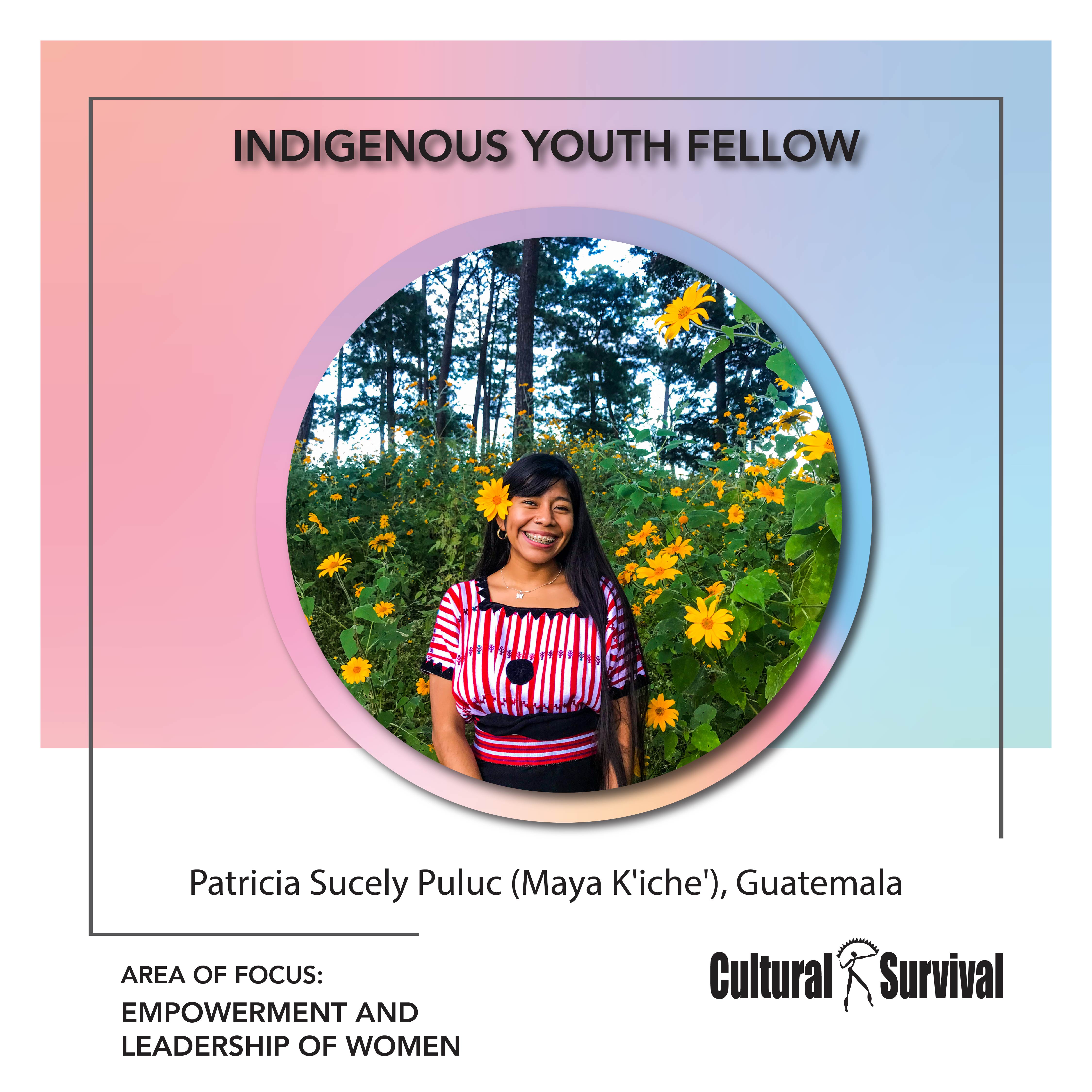
Patricia Sucely Puluc (Maya K’iche’ and Kaqchikel) from Guatemala
Area of focus: Empowerment and Leadership of Women
Patricia Sucely Puluc (Maya K’iche’ and Kaqchikel) is originally from Cantón Camanchaj, Chichicastenango. A self-taught illustrator, she holds a bachelor’s degree in social work from the University of San Carlos de Guatemala. She has been a speaker in various spaces for youth and Indigenous women, and has illustrated and collaborated with collectives and digital media such as Ciberfemlab in the story “Irene and Mariana, Ruda, and Rising Voices.”
Patricia’s fellowship project, “Ru Chuqab´ Ri Kisamaj Ri Ixoqui´Chin Kichajij Ri K´aslen’”(Women’s Strengthen and Work for the Care of Life), seeks to recognize and reclaim the narratives of Indigenous women, who safeguard the elements of life such as water and seeds as a way of defending their lands. To learn more about her work and view graphic illustrations, find her on Instagram @Molcajette or visit her website: Molcajette.
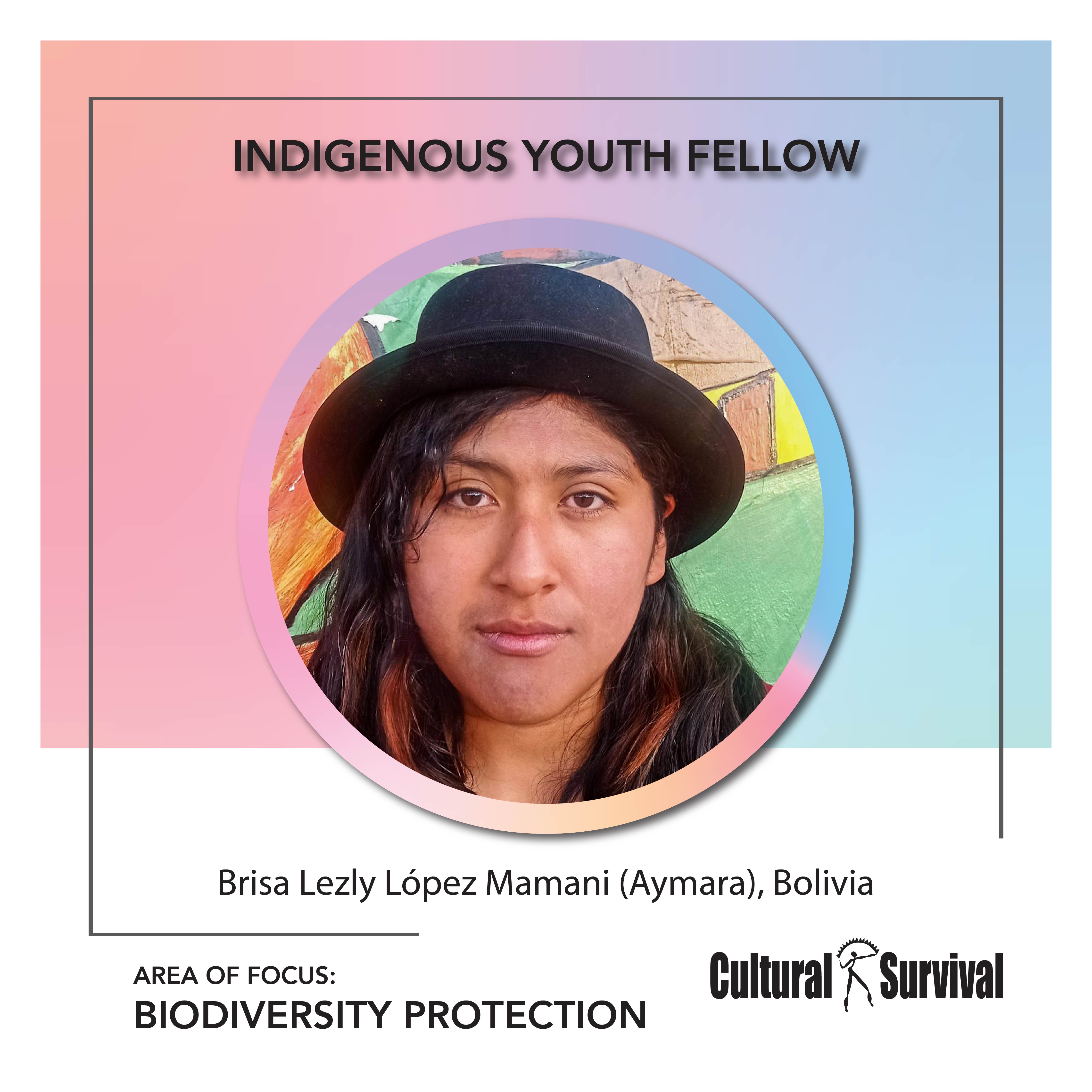
Brisa Lezly López Mamani (Aymara) from Bolivia
Area of Focus: Biodiversity Protection
Brisa Lezly López Mamani (Aymara) is involved in theatrical art and the recovery of ancestral knowledge. She is 17 years old and in the fifth year of high school at the Porvenir de Cañuma Educational Unit in the District of Calamarca, La Paz, Bolivia.
The objective of her fellowship project is to protect ancestral knowledge, recover healthy Indigenous foods, and bring awareness to the care of the spiritual life of water to youth through educational and artistic actions.
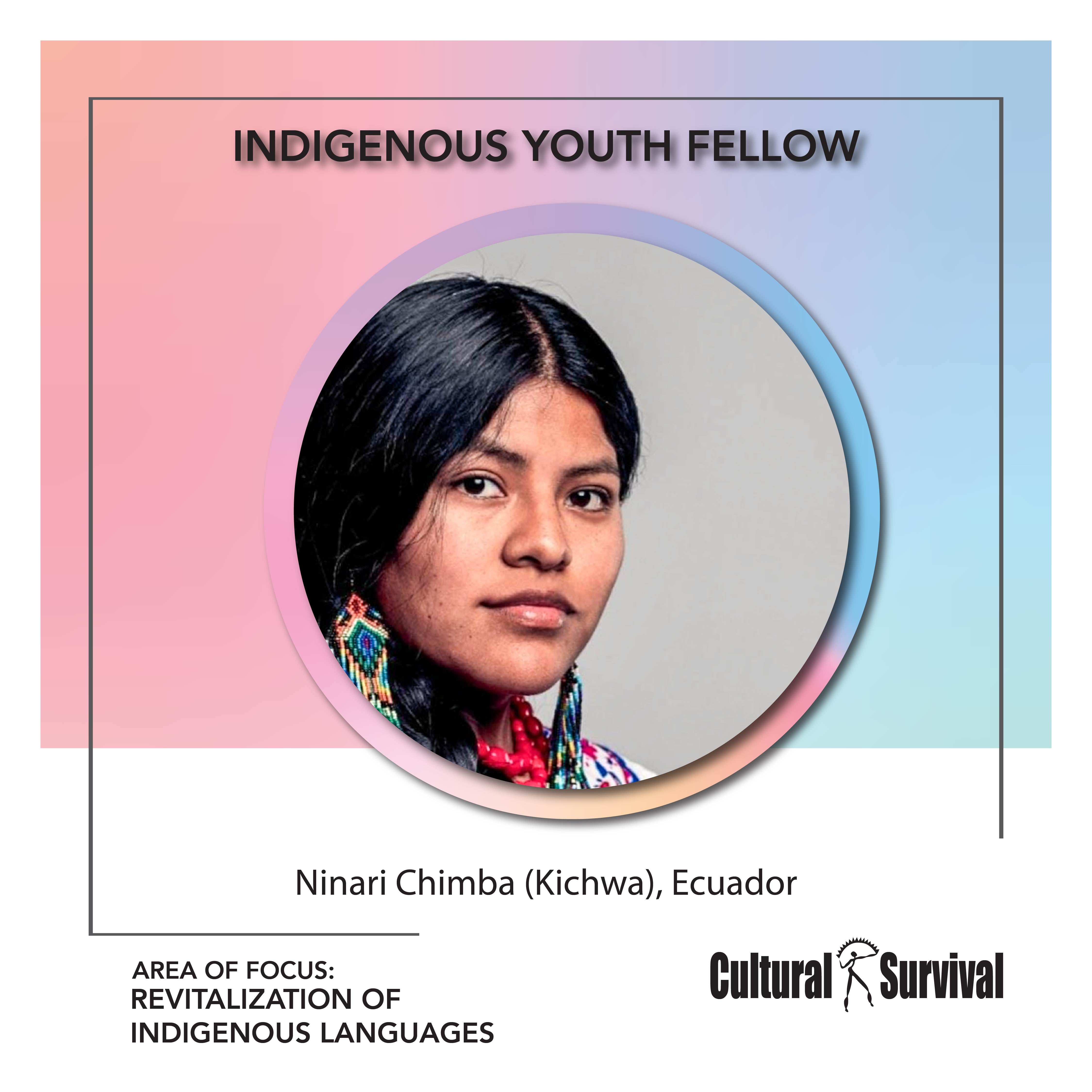
Ninari Chimba (Kichwa) from Ecuador
Area of Focus: Revitalization of Indigenous Languages
Ninari Chimba (Kichwa) identifies as a lesbian woman from the Panzaleo and Otavalo Peoples in Ecuador. She is a primary school teacher, singer-songwriter, actress, researcher, consultant, and workshop leader who approaches her work from an anti-racist, campesino, ecofeminist Indigenous perspective. She has significant experience in intercultural bilingual education and has consulted in the areas of education, gender issues, and art.
Ninari’s fellowship project,”Muyuntik shimi” (Cycle of Native Language), will create a holistic written module of basic level Kichwa education with an Indigenous ecofeminist and anti-racist perspective. In addition, she will organize workshops using musical and artistic techniques.

Saraí Jiménez Orozco (Mixe) from Mexico
Area of focus: Revitalization of Indigenous Languages
Saraí Jiménez Orozco (Mixe) is a speaker of Ayuuk from San Marcos Moctum in the municipality of Totontepec Villa de Morelos, Mixe, Oaxaca. She holds a degree in Administration and Sustainable Development from the Instituto Superior Intercultural Ayuuk A.C. of the State of Oaxaca in Jaltepec de Candayoc Mixe, where she also taught Ayuuk. She was part of the postgraduate program of the University of Deusto Spain in Human Rights in 2022, and currently collaborates with Servicios del Pueblo Mixe in the Department of Gender and Mixe Women.
Her fellowship project, “Atëëmt” (Seed of the Word), is an initiative that contributes to the revitalization of Ayuuk among the children of the Orquídeas Peoples, documenting their experiences of living with the Ayuuk language and what it means to speak the ancient language in the community of San Marcos Moctum.
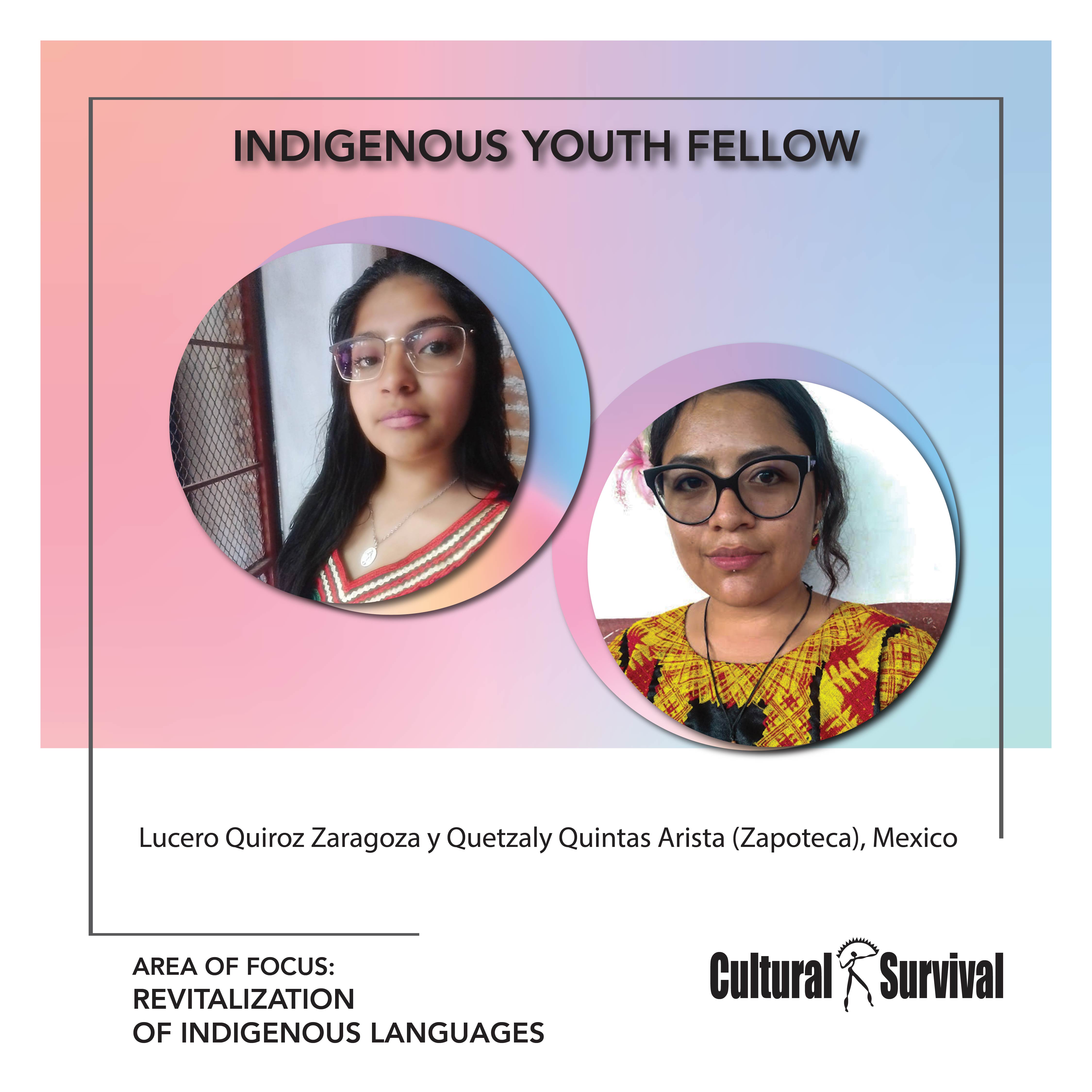
Lucero Quiroz Zaragoza and Quetzaly Quintas Arista (Zapoteca) from Mexico
Area of focus: Revitalization of Indigenous Languages
From a very young age, Lucero Quiroz Zaragoza and Quetzaly Quintas Arista (Zapoteca) have been passionate about their cultural heritage. Quetzaly studied linguistics and has dedicated her life to the revitalization of the Dadi’idznu (Zapoteco) language, offering Dadi’idznu language classes. Lucero is currently studying Computer Systems Engineering. Both aspire to strengthen their Dadi’idznu culture and language among Indigenous youth.
Their fellowship project, “Gibäñ dadi’idzn,” seeks to revitalize Dadi’idznu through the collection, creation, and dissemination of text and audiovisual materials on a digital platform for use in teaching the language in educational institutions or for self-learning.

Kseniia Bolshakova (Dolgan) from Russia
Area of focus: Revitalization of Indigenous Languages
Kseniia Bolshakova (Dolgan) is a language activist and writer and member of the
Dolgan Tribal community Yydyna (“Moonlight” in Dolgan). Kseniia was born and raised in the native Dolgan settlement of Popigay on the Taymyr peninsula in northern Siberia. Kseniia’s work is focused on revitalizing the languages of Siberia and the Far East. She currently works as a content manager of the Yakut language learning application, Sahalyy, as an editor of the lexical database and electronic dictionary of the Chukchi language. She is also a linguistic data coding assistant on the Kumandy language at Dartmouth College.
Kseniia’s fellowship project, “Haka Huruk: Transmitting Dolgan Values by Creating Dolgan Literature,” focuses on revitalizing the Dolgan language through storytelling and development of bilingual literature in Dolgan and Russian. Kseniia will write stories and create a book that will be shared among Dolgan communities. The content will also be uploaded to an accessible virtual platform to facilitate access abroad, promoting Dolgan culture and language.
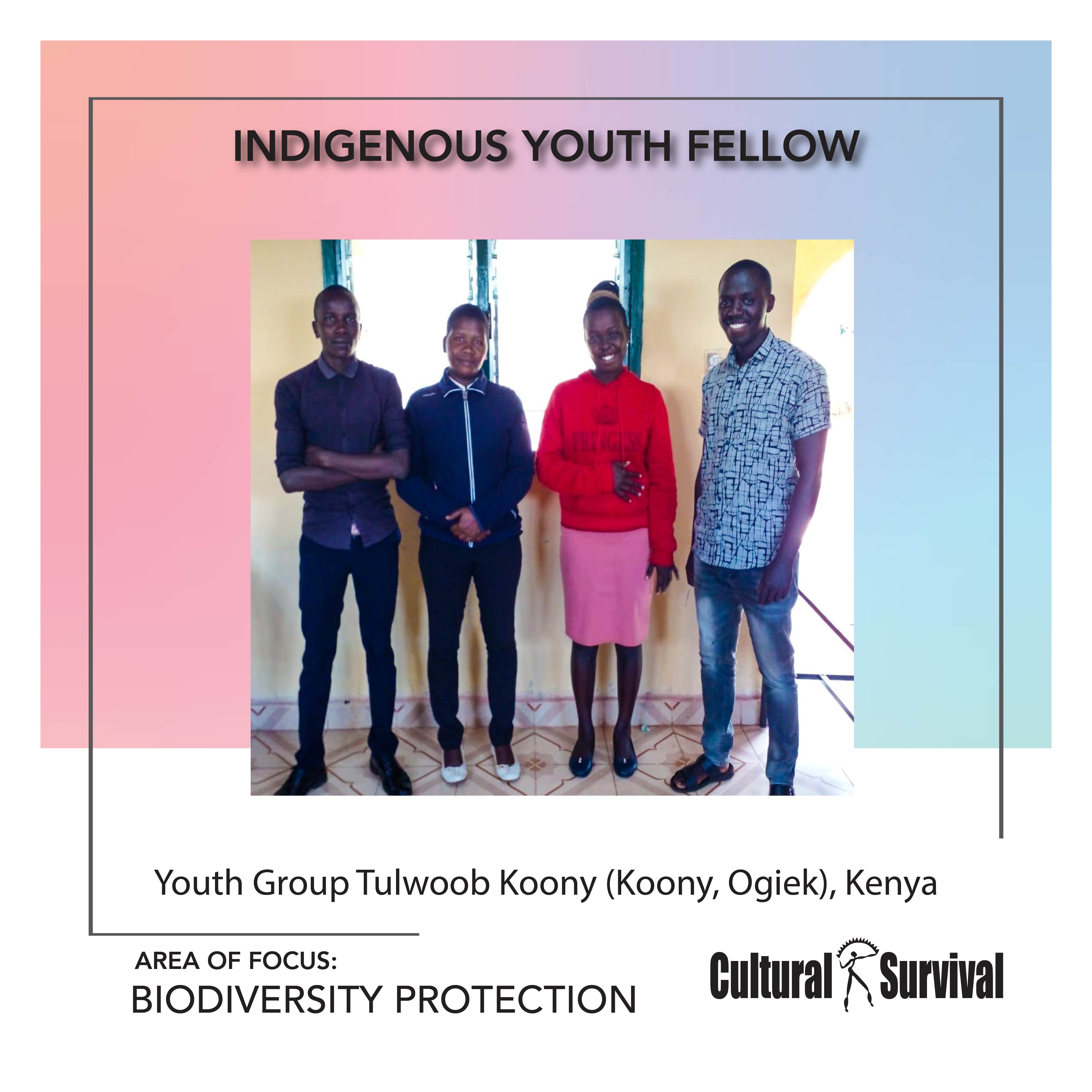
Youth Group Tulwoob Koony (Ogiek and Koony) from Kenya
Area of focus: Revitalization of Indigenous Languages
James Kwemoi (Ogiek), Ruth Chesang (Ogiek), Miriam Naibei (Koony), and Emmanuel Kiplimo (Ogiek) are from the Ogiek community of Mount Elgon and actively promote their Indigenous roots, cultures, and languages through community radio and multimedia platforms. They are concerned with the decline of Koony language speakers among the youth.
Their fellowship project, “Revitalizing the Endangered Koony Language,” aims to increase the number of fluent Koony speakers and to create awareness about the importance of promoting and strengthening Koony language and culture. To illustrate to their people how the Koony language is an integral element of their culture, they will conduct and facilitate Koony language classes and create materials for adults, youth, and children to reclaim their mother tongue. Fellows will also record sessions for digital and social media outlets in an effort to continue the learning process.
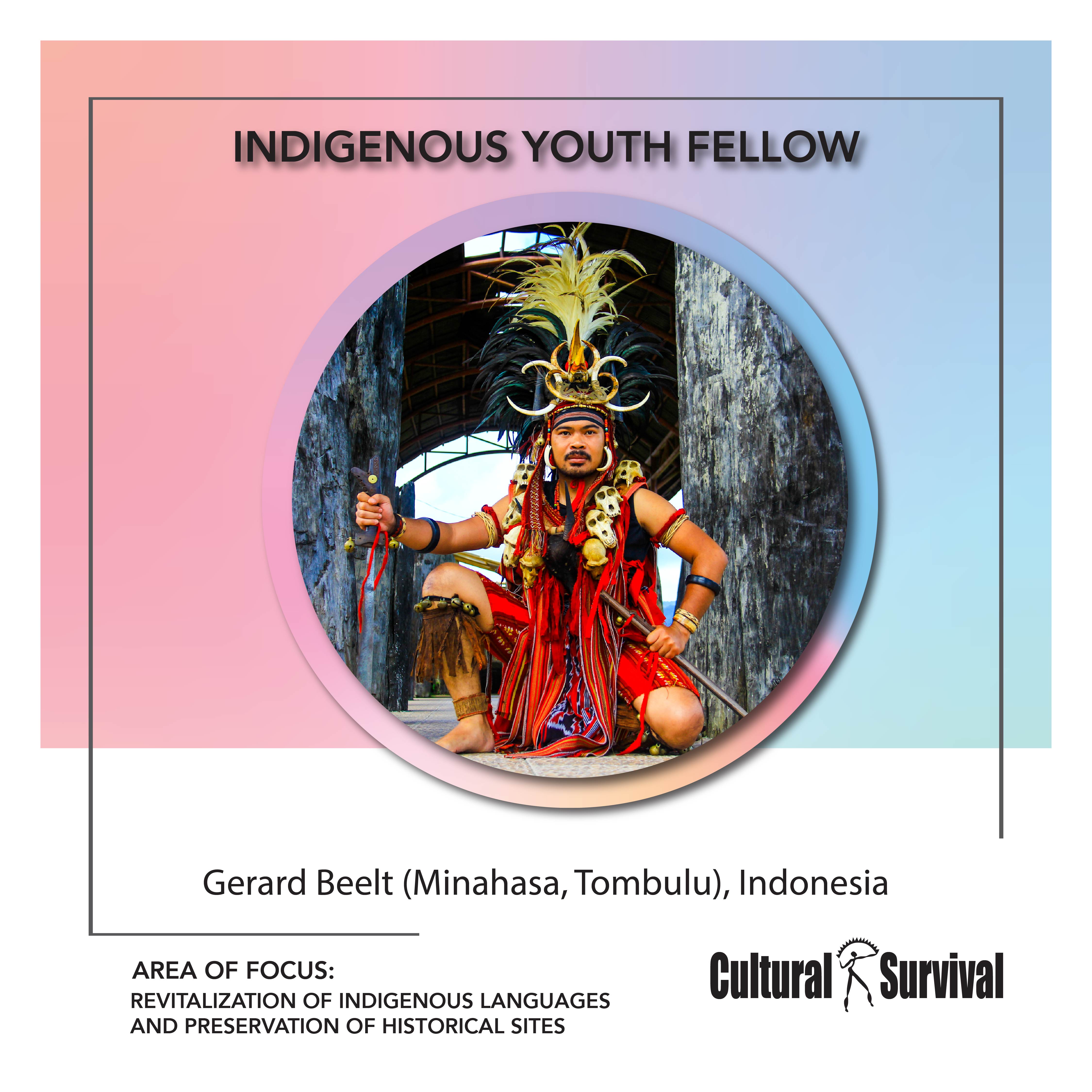
Gerard Beelt (Minahasa, Tombulu) from Indonesia
Area of focus: Revitalization of Indigenous Languages and Preservation of Historical Sites
Gerard Beelt (Minahasa, Tombulu) is from the Minahasa Peninsula in North Sulawesi province, Indonesia. He has trained nationally and internationally to enhance his theoretical and practical knowledge, which culminated in his participation as an Indigenous youth in the INSPIRASI Program run by New Zealand’s UnionAID and Indonesia’s BaKTI Foundation. He also takes courses in Social Science and Public Policy at Auckland University of Technology.
Gerard’s fellowship project, “Sumungkul Wangko,” seeks to revitalize the Minahasan culture, customs, and traditions by restoring aspects of Minahasan heritage such as the waruga (ancient sarcophagus) and the toitow (anthropomorphic stone), which are historical and spiritual sites traditionally used by the Minahasa people in North Sulawesi, Indonesia. He will create documentation and publish a bilingual book in the Bahasa and Minahasa languages to introduce the youth to Minahasa knowledge, traditions, and language. He also plans to develop a documentary film on Minahasan culture and language.
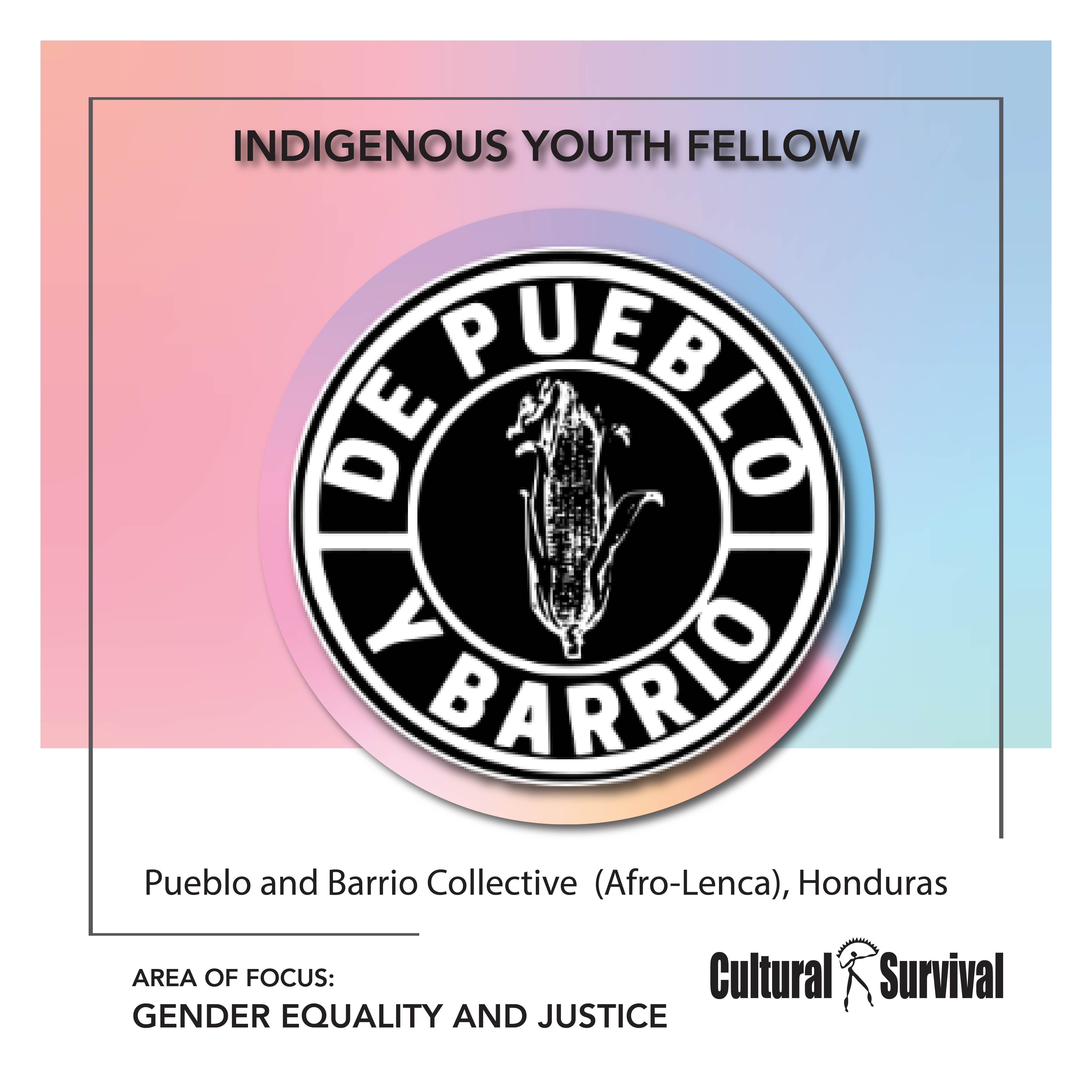
Pueblo and Barrio Collective (Lenca, Afro-Indigenous) from Honduras
Area of focus: Indigenous Knowledge and Storytelling
The Pueblo and Barrio Collective is a space for community sharing and the first organization led by Afro-Indigenous Lenca youth and youth of underrepresented genders. Their radio program, “Sembrando Rebeldías,” airs on Thursdays on Disonancias Radio, a digital community radio station, and on the COPINH Community Radio, Radio Guarajambala 100.3 FM, which is also rebroadcast by other Lenca community radio stations.
The Collective works to sustain the historical memory of the Lenca Peoples through the recovery and practice of their Indigenous languages, art, food sovereignty, self-governance, and alternative technologies and media.
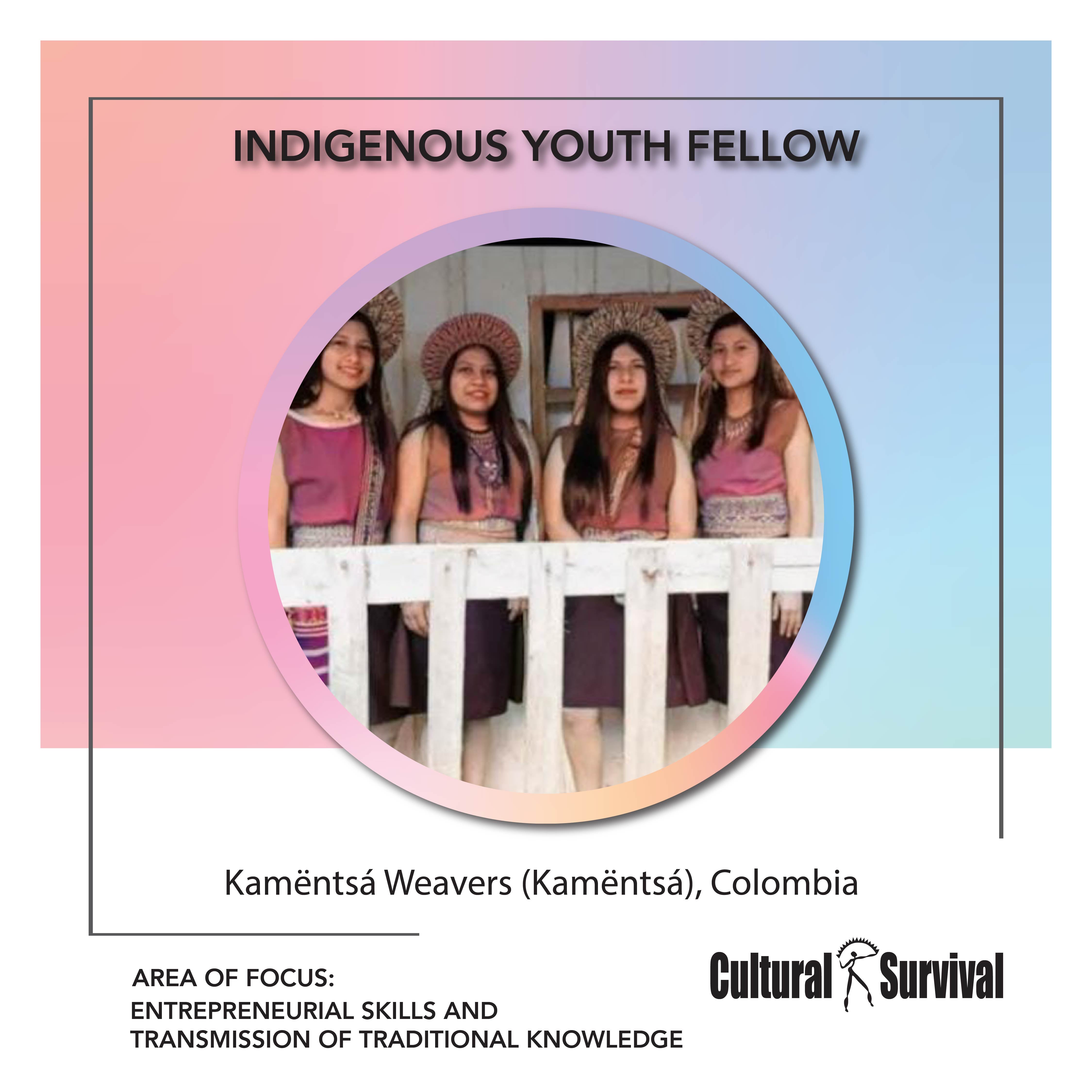
Kamëntsá Weavers (Kamëntsá) from Colombia
Area of focus: Entrepreneurial Skills and Transmission of Traditional Knowledge
Leydi Johana, Nelly Adriana, and Erika Viviana (Kamëntsá) are from the Kamëntsá Indigenous community of the municipality of San Francisco, department of Putumayo. They are known as the Kamëntsá Weavers. Kamëntsá Weavers was formed with the purpose of strengthening traditional weaving techniques that promote the culture and artistic expressions of Kamëntsá Peoples for the next generations. Their families’ participation has been fundamental in this process, as this transmission of knowledge has allowed them to weave their own stories, thoughts, and healing through the threads.
Their fellowship project, “Strengthening and Recovery of an Ancestral and Cultural Fabric of the Kamëntŝá Indigenous Community: Basketry,” aims to consolidate collaborative working groups in the community to share new knowledge and creativity about traditional basketry to inspire other artisans and to create innovative accessories with traditional meaning. This exchange will generate new, innovative strategies while promoting the Kamëntŝá culture and language. All of the exchanges and teachings will be held in Indigenous languages.
